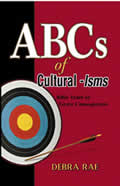TODAY'S
TACTICAL PURSUIT OF RELIGIOUS COMMONALITY
PART 2
By
Debra Rae
August 10, 2011
NewsWithViews.com
Baited by Buddlam
These days, while describing themselves as “spiritual,” increasing numbers of Westerners embrace “no religious affiliation.” Though creed, commandments, and ritual are falling by the wayside, the impulse to link with some “higher being” appears to be on the rise.
East is East, and West is East
To postmodernists, whatever brand of spirituality floats one boat is fine—just as long as the boat’s not rocked. In the West, religious inclusionism appeals especially to nominal Christians. For mainline church folk committed to the Doctrine of Tolerance, “Chrislam” fills the bill nicely. After all, “ecumenical reconciliation” beats the alternatives—i.e., jihad and War on Terror.[1]
On the other hand, pursuers of religious commonality in the East favor what’s called “Buddlam,” doctrinal mix of Buddhism with Islam.[2] Syncretistic Buddlam poses no problem to Buddhists who historically endorse “many paths.” Nor even to Islamists who tactically embrace inclusionism all the while coddling their own desired end to the contrary.
For the sake of building upon “common ground”—this, in an effort to reconcile creeds that logically clash—willing inclusionists take one for the team, as it were, by forfeiting (or feigning to forfeit) traditional core doctrines of their respective religions.
Syncretism on the Sly
Contrary to popular belief, not all orthodox Muslims are offensive activists who refuse to assimilate. Some are defensive pacifists for whom assimilation (or presence) serves an underlying objective to preserve the house of Islam (dar-al-Islam) and foster its growth.
In short, the destiny mission for all orthodox Islamists is complete world dominance. It’s believed that, in time, the community of non-Muslims (dar-al-kuffer) will comply, whether by conversion or coercion; and one caliph armed with sharia will rule over a global community of all those who affirm Islam (ummah).[3]
With a single eye for this Islamic Grand Design, Muslim proponents of Buddlam target and, then, strategically downplay religious differences—this, in the bogus name of “religious harmony.” Islamists are okay with deception for self-interest.[4]
Put another way, Islamic precedence accepts that the end (ummah) justifies the means—e.g., identifying with other faiths, if only superficially, as a semblance of solidarity. Other tactics include recasting mismatched beliefs as “similar,” or simply trivializing them as superfluous when, in fact, they are not.
Once Islam’s taproot is well established, the faithful are free to drop the façade and, then, summons the conquered to heed the call of Allah to Islam (da’wah) whereupon shouts of Allahu akbar, meaning “Allah is Greater,” will silence the defunct, but currently useful “many-paths-to-God” mantra.[5]
• First: Outward Identification in a Show of Solidarity
Throughout the hajj, Muslim men are required to dress alike in order to represent equality of all Muslims, whether rich or poor. Regardless of one’s sect or country of origin, male pilgrims don sandals and drape themselves in two sheets of white cloth to remind them of simplicity, humility, and self-purification.
Not unlike Muslim Arabs whom the early 11th century Sanskrit Texts depict as “white-clad” invaders, Buddhists with shaved heads also wear special robes. Buddlamists applaud this outward identification, if only by wardrobe, as apparent indication of solidarity, if not sameness.[6]
With this in mind, I recall a popular comedy routine from decades past in which the Smothers Brothers sang a memorable, tongue-in-cheek ditty. Lyrics expounded on wearing the collar, hat, raincoat, and shoes of a sailor (anthropologist, or refrigerator repairman—whatever) so that some day they’d be sailors, too—“the same as their old man.”
Though Buddhist, the Dalai Lama visits local mosques and dons Islamic garments—but for the sake of conciliation, not comic relief. Either way, conventional wisdom remains in tact: Superficial identification with a sailor, or a Muslim, doesn’t a sailor or Muslim make. Nor does it negate authentic characteristics of real sailors or Muslims. To presume otherwise is delusion, or perhaps even an act of deception.
• Next: Framing Mismatched Beliefs as “Similar”—e.g., Doctrines, Devotions and Practices
Once again, Islamic precedence accepts that the end (ummah) justifies the means—i.e., identifying with other faiths as a semblance of solidarity, if only superficially. Yet another tactic employed by religious syncretists is to recast mismatched doctrines, beliefs, and practices as being “similar” when, in fact, they are not.
Doctrinal Similarities
For example, Buddlam tacticians fashion incompatible, core doctrines of Buddhism and Islam as if they were agreed upon Islamo-Buddhist “talking points.”
Re.: The Prophet/Maitreya
Some religionists associate the future Buddha Maitreya (the Loving- or Merciful- One) with the Prophet Muhammad (servant of the Merciful One), but presumed similitude doesn’t stop here. Qur’anic mention of the fig tree is thought by some to reference Buddha, who purportedly attained enlightenment at the foot of one.
More specifically, Buddha is “the one from Kifl” (the Prophet, characterized in the Qur’an as patient and good). However compelling these comparisons, Buddlamists err by pairing Buddha and Muhammad as principled “messengers” intent on achieving the same things; but the respective world religions birthed by them belie this fallacy.[7]
Re.: Muhammad/Rahman
It’s noted that early 11th century Sanskrit Kalachakra Texts contain beliefs fundamental to Islam—e.g., texts apply a Persian word used for white-clad Arab invaders whose destiny was to please the Compassionate One (Rahman). Some go so far as to identify Muhammad as an avatar (incarnation) of Rahman whose triumphs affected a higher rebirth in paradise. Drawing from convoluted notions, as these, Buddlamists devise and advance a fanciful pipe dream promising religious harmony, understanding, and peaceful cooperation.[8]
Re.: Greater Jihad/Triumphant Mind Battles
To Buddlamists, jihad (“proper effort”) resonates with the Triumphant One (Buddha) said to have won the mind battle over ignorance, greed, attachment, anger, and hatred. For both camps (Buddhism and Islam), no price is too dear. Today’s Islamic suicide bombers (more accurately, “homicide” bombers) bring to mind Zen monks who incinerated themselves during the Vietnam War. Because Buddhist teachings include something similar to a lesser jihad, and the greater jihad is the struggle against lust, it stands to reason that Buddhists can and should dialogue doctrinally with Islamists.[9]
Devotional Similarities
Beyond reconciling incompatible doctrines as if they really were reconcilable, Buddlam tacticians attribute fallacious similarities to devotional practices of two distinctly separate world religions.
Sharia/Meditation
The Arabic word sharia (meaning “the grand boulevard” or “the street”) encompasses ritual worship, transactions and contracts, morals and manners, beliefs, and punishments. In short, it represents law that people must obey for metaphorical traffic to move easily in the world.
Though Buddha did not teach a legal code, Muhammad did. A Muslim under sharia may not convert to Christianity, steal, or commit adultery under threat of punishment, be it flogging, stoning, amputation, or execution. Legally, he may redeem holy ground, assist jihadists, fake peace, and endorse female genital mutilation and/or polygamy.
In contrast, Buddhist ethical teachings are derived from Kalachakra Tantra, not sharia; and Buddha’s foundational belief was restraint from ten especially destructive actions—including physical acts of killing, stealing, and inappropriate sexual behavior; verbal ones of lying, speaking divisively, using harsh and cruel language, speaking idle words; and mental ones of covetous thinking, thinking with malice and distorted, antagonistic thinking with which one denies the value of anything positive.
By intentionally mischaracterizing sharia as “methodoloy to attain truth,” Buddlam pairs it with Buddhist meditation, but wrongly so. While sharia is clearly a set of “do’s” and “don’t’s,” Buddhist meditation is not. Rather, it involves a variety of techniques to develop mindfulness, concentration, tranquility, and insight.[10]
Dhikrs/Mantras
Islamists and Buddhists employ divergent, but seemingly similar methods to overcome pitfalls and obstacles. For example, repeated recitation of Buddha’s names and sacred syllables (mantras) counted on rosary beads purportedly parallels recitation of dhikrs in Islam. Just as Sufis recite the names of God, Buddhists praise the names of Manjushri.[11]
Concluding Thoughts
Simply put, syncretism is doctrinal mix as evidenced in the growing popularity of Buddlam, doctrinal mix of Buddhism with Islam. While pursuers of religious commonality in the West favor Chrislam, those in the East favor Buddlam.
| Subscribe to the NewsWithViews Daily News Alerts! |
Postmodernists accept most any brand of spirituality that isn’t unduly divisive. For the sake of building upon “common ground”—this, in an effort to reconcile creeds that logically clash—compliant religionists from Buddhism and Islam both forfeit (or feign to forfeit) traditional core doctrines of their respective religions.
Accordingly, Islamist pacifists tactically embrace Buddhism with no mind to yielding their Grand Design for Islamic dominance. When it serves their own purpose, making friends with their nemesis is fine. So is recasting infidels’ beliefs as somehow “similar.” These understand that, once Islam’s taproot is well established, the faithful may drop the façade of conciliation and, in turn, summons the conquered to heed the call of Allah to Islam.
More to follow in Part 3.
Click here for part -----> 1, 2,
Footnotes:
1.
The
Plain Truth
2.
Alexander Berzin. “Buddhist-Muslim Doctrinal Relations: Past,
Present, and Future.” Originally published with extensive footnotes
in Buddhist Attitudes toward Other Religions, ed. Perry Schmidt-Leukel.
(St. Ottilien: EOS Verlag, 2008): 212 – 236.
3.
Debra Rae. “Islamic Fundamentalism.” ABCs of Globalism:
A Vigilant Christian’s Glossary. (Lafayette: Huntington House
Publishers, 1999): 160.
4.
Muhammad bin Maslama once admitted, “Messenger, we shall have
to tell lies.” To that, the Prophet replied, “Say what you
like; you are absolved, free to say whatever you must” (Ishaq:
365; Tabari VII: 94). See also click
here.
5.
William Wagner. “The Quiet Revolution.” How Islam Plans
to Change the World. (Grand Rapids: Kregel Publications, 2004): 39-42.
6.
Reza Shah Kazemi. “Introduction.” Common Ground between
Islam and Buddhism. (Louisville: Fons Vitae,2010): Introduction by H.H.
the Fourteenth Dalai Lama and H.R.H. Prince Ghazi bin Muhammad.
7.
Tenzin Gyatso. “Many Faiths, One Truth.” (New York: New
York Times, 24 May 2010): The Opinion Pages.
8.
Historical,
Cultural, and Comparative Studies – Buddhism and Islam.
9.
Berzin, Buddhist Attitudes, 79-110
10.
Berzin, Buddhist Attitudes, 79-110
11.
Berzin, Buddhist Attitudes, 79-110












 Share
This Article
Share
This Article







